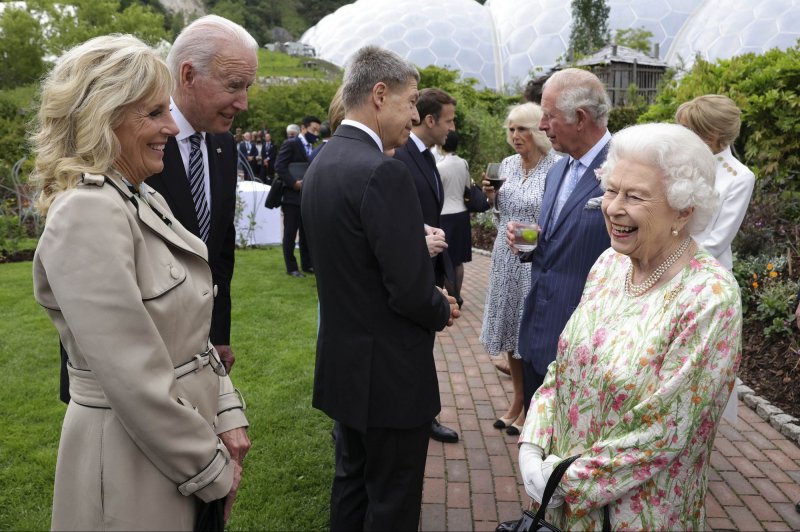1 of 5 | U.S. President Joe Biden and first lady Jill Biden speak with Queen Elizabeth II during a reception and dinner in Cornwall, Britain, on Friday. Photo by Andrew Parsons/No. 10 Downing Street |
License Photo
Unlike his predecessor's first trip to Europe, thus far, President Joe Biden's performance and preparation deserve an "A." Of course the main event is today with Russian President Vladimir Putin. But as long as that meeting does not repeat the Baked Alaska summit with China in Anchorage, Alaska, it may be hailed as a success.
The high point of the trip so far was not the Group of Seven summit that in terms of bonhomie if not content went extremely well. It was the visit of the president and first lady to Windsor to see Queen Elizabeth II in the pomp, circumstance and grandeur of the palace. When asked later of his impressions of the 95-year-old monarch, Biden's response was brilliant in its simplicity. Biden said, "She reminded me of my mother."
Queen Elizabeth has been called many things. When Donald Trump left Windsor after his visit, he told the escorting party that the queen was one of the most remarkable people he had ever met. No doubt that was not an uncommon reaction. However, I would take a very large bet that few before Biden made his comment. And I would also bet that his comment has secured the president and first lady a place in the queen's heart.
Whether Biden has secured a place in the hearts of his G7 colleagues is another matter. But the atmospherics could not have been better. It was self-evident from the videos and comments that the group was unanimous in having America back and a president with whom, as Margaret Thatcher remarked about another leader, "someone with whom we can do business."
That said, the G7 meeting papered over a number of profound tensions and issues that remain unsettled. First, for all the picturesque settings of a gloriously beautiful part of England accompanied by splendid weather, the irony was both striking and hidden from view. Cornwall, on the southwest coast, is among the poorest shires in the land. Here then were the richest industrial nations in the world meeting amidst impoverished circumstances.
The metaphor applies to much of the world. Disparities in wealth are growing, exacerbated by a combination of the COVID-19 pandemic, extreme weather and environmental disasters. More people have died in 2021 than in 2020 from COVID-19. And while, for the time being, most Americans are assuming that the worst of it is over, and life can return more or less to normal, those reactions may well be premature.
The G7 promised a billion vaccines to be made available globally, a noble first step. Still, that is some 10 billion or more short. And as Biden warned in his press conference after the G7 meeting, the logistics of distribution and actually getting shots in arms are daunting.
The president did get a compromise on China and a commitment to human rights without condemning China for its treatment of its Uighurs. That dilution has evoked criticism from both sides of the aisle at home. However, the Europeans have a more pragmatic and less ideological view of China than most Americans. Perhaps we should listen.
Regarding China, Europeans can be accused of appeasement by one extreme and economic seduction by the other. Those are unfair allegations. During the Cold War, Europe showed better sense than America regarding Vietnam. Europe also opposed the second Iraq war and was correct in that judgment. Having a more tempered view of China is important. However, in Washington the only issue on which members of Congress seem to agree is that China is the main threat, even though there is no consensus on what that threat exactly is.
One ticking time bomb that has not garnered the attention it needs is the Northern Island-European Union border debate. With Brexit, the agreement between Whitehall and Brussels, Belgium, has been unsatisfactory to Northern Island in terms of the customs border. Popular unrest in the North over its status is growing as it strongly favored remaining in the EU. Concurrently, substantial pressure from the political party Sinn Fein for reunification with the South is mounting -- a toxic mix.
The United States and United Kingdom signed a new version of the 1941 Atlantic Charter originally agreed to by Winston Churchill and Franklin D. Roosevelt underscoring a revitalized if not "special" relationship. But the Northern Island issue could explode in Prime Minister Boris Johnson's face. If it does, the U.K. will have a political crisis that would surely undermine the Atlantic Alliance and, more importantly, its future.
Still, two and three-quarters cheers for the G7 meeting.
Harlan Ullman is senior adviser at Washington, D.C.'s Atlantic Council and author of "The Fifth Horseman and the New MAD: How Massive Attacks of Disruption Became Looming Existential Dangers to a Divided Nation and the World at Large."















